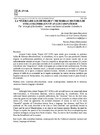Please use this identifier to cite or link to this item:
https://accedacris.ulpgc.es/jspui/handle/10553/56251
| Title: | La “Fuerza de los humildes”: memoria e historia de otra Colombia en "Vivan los compañeros" | Other Titles: | The “strength of the humbles”: memory and history of another Colombia in Vivan los compañeros | Authors: | Becerra Bolaños, Antonio Pérez Hernández, Nayra |
UNESCO Clasification: | 6202 Teoría, análisis y crítica literarias | Keywords: | Literatura afrocolombiana Cuento contemporáneo Literatura de la violencia Memoria e historia Lenguaje e identidad, et al |
Issue Date: | 2018 | Journal: | Alpha | Abstract: | Aunque Carlos Arturo Truque (1927-1970) sigue siendo poco conocido, no podemos hablar de literatura afrocolombiana, ni colombiana, sin su aporte. Con una producción literaria dispersa en publicaciones periódicas, el chocoano apuesta por el cuento cuando este no era suficientemente valorado en su país. Vivan los compañeros recoge todos sus cuentos (25), en los que se acerca tanto a los personajes excluidos de la sociedad como a los episodios de la historia colombiana más “vergonzosos”, desde un lenguaje que se aleja de todo academicismo. Su obra, calificada en la época de “literatura sucia”, y ubicada concretamente en el Chocó y el puerto de Buenaventura, no es ajena a cualquier injusticia humana. Además, la necesidad de Truque de plasmar el habla de su comunidad no le impide contemplar las nuevas técnicas narrativas que llegaban entonces de Norteamérica. Así, renueva el cuento colombiano desde el plano formal y de contenido. Although Carlos Arturo Truque (1927-1970) is still not well known, we cannot talk about Afro-Colombian, or Colombian literature, without mentioning his contribution. With an unfocused literary production in periodic publications, the “chocoano” bets on the short story when this genre was not highly valued in his country. Vivan los compañeros collects all his short stories (25), where he approaches the excluded characters of society as well as the more “shameful” episodes of Colombian history, from a language that distances itself from all academic art. His work, described at the time as “dirty literature” and specifically located in Chocó and the port of Buenaventura, is not alien to any human injustice. Besides, the need for Truque to express the speech of his community does not prevent him from contemplating new narrative techniques coming from North America. Thus, he renews the Colombian short story from the formal level and its content. |
URI: | https://accedacris.ulpgc.es/handle/10553/56251 | ISSN: | 0716-4254 | DOI: | 10.32735/S0718-220120180004700167 | Source: | Alpha [ISSN 0716-4254], n. 47, p. 105-120 | URL: | http://dialnet.unirioja.es/servlet/articulo?codigo=6915746 |
| Appears in Collections: | Artículos |
Page view(s)
87
checked on Jan 11, 2026
Download(s)
90
checked on Jan 11, 2026
Google ScholarTM
Check
Altmetric
Share
Export metadata
Items in accedaCRIS are protected by copyright, with all rights reserved, unless otherwise indicated.
